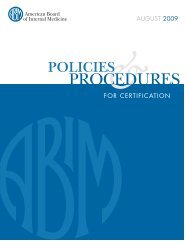The SRA Symposium - College of Medicine
The SRA Symposium - College of Medicine
The SRA Symposium - College of Medicine
Create successful ePaper yourself
Turn your PDF publications into a flip-book with our unique Google optimized e-Paper software.
Papers<br />
Changes to 5 C.F.R. §5501.109 made clear that not even the requirements set forth by the OGE (at<br />
5 C.F.R. part 2635, subpart H) and the HHS supplemental standards <strong>of</strong> employee ethical conduct<br />
(at 5 C.F.R. §5501.106) satisfied HHS that Congress and the public would find the actions <strong>of</strong> NIH<br />
employees sufficiently ethical. Thus, in addition to prohibiting:<br />
* * *<br />
. . . employees <strong>of</strong> the NIH and other employees <strong>of</strong> HHS from providing certain services,<br />
for compensation, in the preparation <strong>of</strong> grant applications, contract proposals or other<br />
documents to be submitted to HHS, and from compensated outside employment with<br />
respect to a particular activity funded by an HHS grant, contract, cooperative agreement,<br />
or other funding mechanism authorized by statute, or conducted under a cooperative<br />
research and development agreement (CRADA)<br />
* * *<br />
[under Interim Final Rule Sec. §5501.109(c)(1)] all NIH employees are also prohibited<br />
from engaging in employment (which includes serving as an <strong>of</strong>ficer, director, or other<br />
fiduciary board member, serving on a scientific advisory board or committee, and consulting<br />
or providing pr<strong>of</strong>essional services) and compensated teaching, speaking, writing,<br />
or editing with a substantially affected organization; a hospital, clinic, health maintenance<br />
organization, or other health care provider (defined comprehensively to include the<br />
types <strong>of</strong> entities that are eligible to receive payments under the Medicare program for the<br />
provision <strong>of</strong> health care items or services); a health insurer; a health, science, or health<br />
research-related trade, pr<strong>of</strong>essional, consumer, or advocacy association; or a supported<br />
research institution. (70 FR 22 (2005), at 5546.)<br />
A “Substantially affected organization” was defined at paragraph (b)(8) to include those entities,<br />
irrespective <strong>of</strong> corporate form, that are engaged in the research, development, or manufacture<br />
<strong>of</strong> biotechnological, biostatistical, pharmaceutical, or medical devices, equipment, preparations,<br />
treatments, or products. <strong>The</strong> term includes those organizations a majority <strong>of</strong> whose members are<br />
engaged in such activities. (70 FR 22 (2005), at 5546.)<br />
After first quoting and then generally disregarding the National Academy <strong>of</strong> Sciences observation<br />
in On Being Scientist, that:<br />
Science is inherently a social enterprise . . . .<br />
* * *<br />
<strong>The</strong> social mechanisms <strong>of</strong> science do more than validate what comes to be known as<br />
scientific knowledge. <strong>The</strong>y also help generate and sustain the body <strong>of</strong> experimental<br />
techniques, social conventions, and other ``methods’’ that scientists use in doing and<br />
reporting research. * * * Because they reflect socially accepted standards in science, their<br />
application is a key element <strong>of</strong> responsible scientific practice. (NAP 1994.) (Cited at 70 FR<br />
22 (2005), at 5549.) the HHS Federal Register Notice set forth examples <strong>of</strong> myriad exceptions<br />
to the newly-imposed rules, which exceptions would free the NIH employee to enjoy<br />
“[t]he social mechanisms <strong>of</strong> science” in the face <strong>of</strong> the 5 C.F.R. §5501.106(d)(3)-imposed<br />
requirement for vetting <strong>of</strong> those social mechanisms the employee’s supervisor and then<br />
the designated agency ethics <strong>of</strong>ficer. (70 FR 22 (2005), at 5549 - 5550.)<br />
<strong>The</strong> February 2005 Interim Final Rule created at new provision at 5 C.F.R. §5501.110, which<br />
prohibited NIH employees who filed public or confidential financial disclosure reports (as well as<br />
their spouses and dependent children) from owning any financial interest—stock or otherwise—in<br />
“substantially affected organizations,” while those who did not have to file such reports were al-<br />
82 2005 <strong>Symposium</strong> Proceedings Book

















